
Abelmoschus esculentus
(MRP Inclusive of all taxes)
- Shipping ₹79 for entire order
- Country of origin: India

(MRP Inclusive of all taxes)
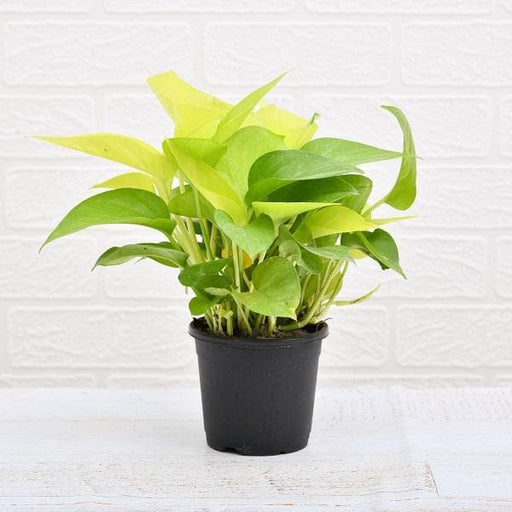 Save 29%
Save 29%
Air Purifier Money Plant with Pot The Air Purifier Money Plant, also known as Pothos or Epipremnum aureum, is a stunning indoor plant that...
View full details
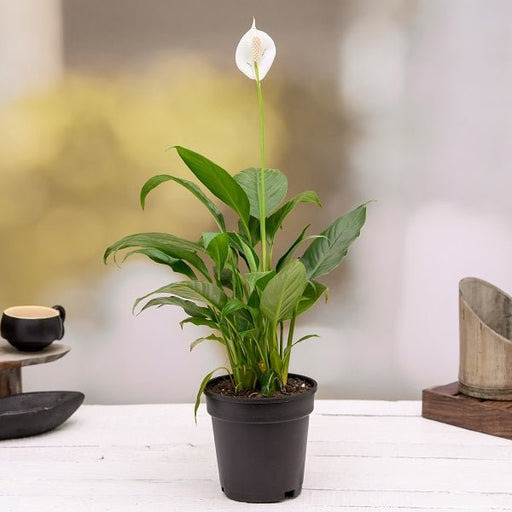 Save up to 15%
Save up to 15%
Peace Lily, Spathiphyllum - Plant The Peace Lily, scientifically known as Spathiphyllum, is a stunning houseplant celebrated for its elegant white...
View full details
 Save 25%
Save 25%
Jasminum sambac, Mogra, Arabian Jasmine - Plant Jasminum sambac, commonly known as Mogra or Arabian Jasmine, is a fragrant flowering plant...
View full details
 Save 18%
Save 18%
Combo Constituents Includes the Parijat Tree (Night-Flowering Jasmine), a culturally significant plant with fragrant flowers. Description The Pari...
View full details
 Save 25%
Save 25%
Miniature Rose, Button Rose (Any Color) - Plant The Miniature Rose, also known as the Button Rose, is a charming and compact flowering plant that ...
View full details Save 25%
Save 25%
Damascus Rose, Scented Rose (Any Color) - Plant The Damascus Rose, also known as Rosa damascena, is a timeless symbol of beauty and romanc...
View full details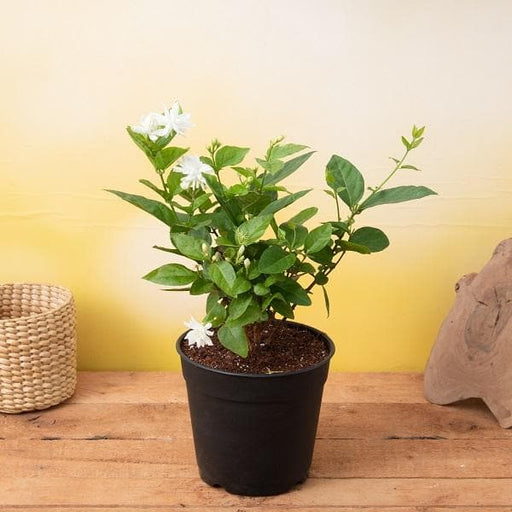
 Save 17%
Save 17%
Beautiful Fragrant Mogra, Arabian Jasmine Plant with Pot The Beautiful Fragrant Mogra, also known as Arabian Jasmine (Jasminum sambac), is...
View full details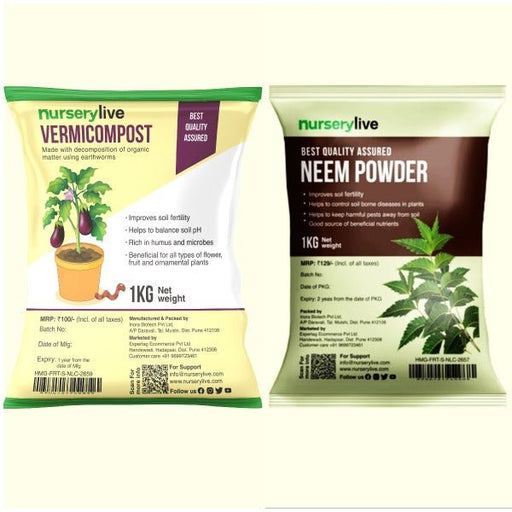 Save 15%
Save 15%
Pack of Vermicompost and Neem Cake for House Plants Transform your indoor garden with our premium Pack of Vermicompost and Neem Cake, spec...
View full details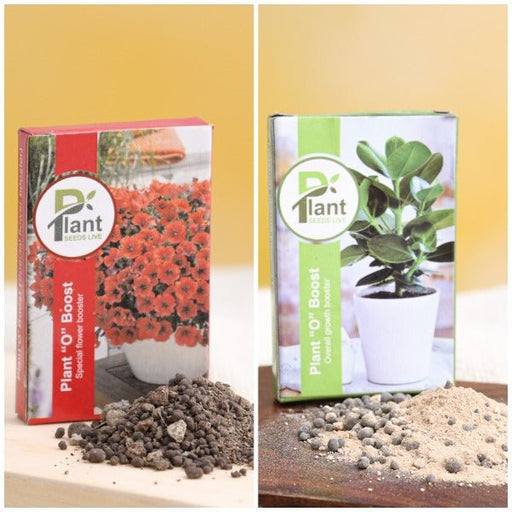
Pack of Plant Growth and Flower Boosters Unlock the full potential of your garden with our Pack of Plant Growth and Flower Boosters! This ...
View full details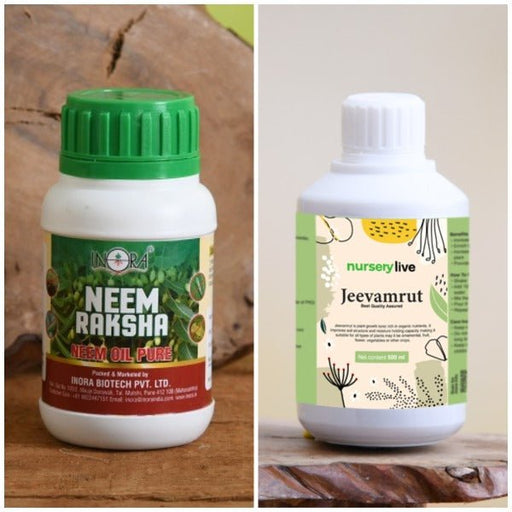 Save 38%
Save 38%
Combo of Jeevamrut and Neem Raksha for Easy Growth and Protection of Houseplants Transform your indoor garden with our exclusive combo of ...
View full details Save 22%
Save 22%
Plant Nutrients Kit (Pack of 16) for a Healthy Garden Transform your garden into a lush paradise with our Plant Nutrients Kit, featuring 1...
View full details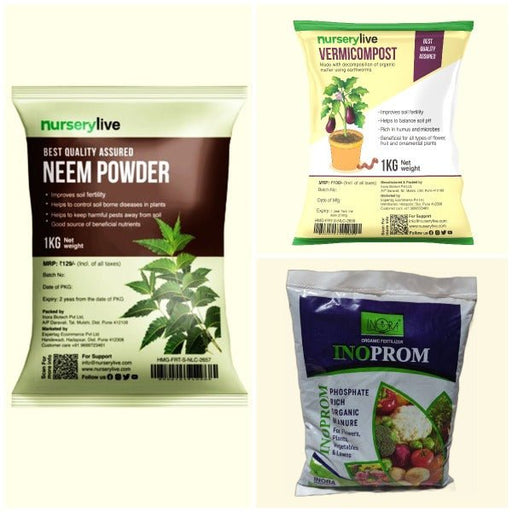 Save 16%
Save 16%
Combo of Top Plant Fertilizers Elevate your gardening game with our exclusive Combo of Top Plant Fertilizers, featuring two bags of premiu...
View full details Save 24%
Save 24%
Pack of 4 Additives to Make Soil Healthy and Nutrient Rich Transform your garden into a thriving ecosystem with our Pack of 4 Additives de...
View full details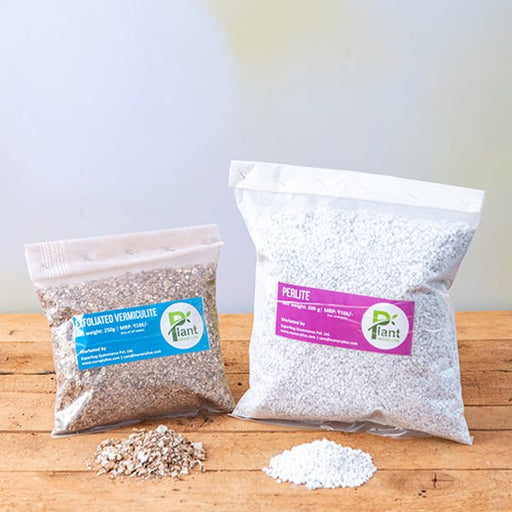 Save 30%
Save 30%
Transform your gardening experience with our premium Combo of Perlite and Vermiculite. This unique blend is designed to enhance soil aeration and ...
View full details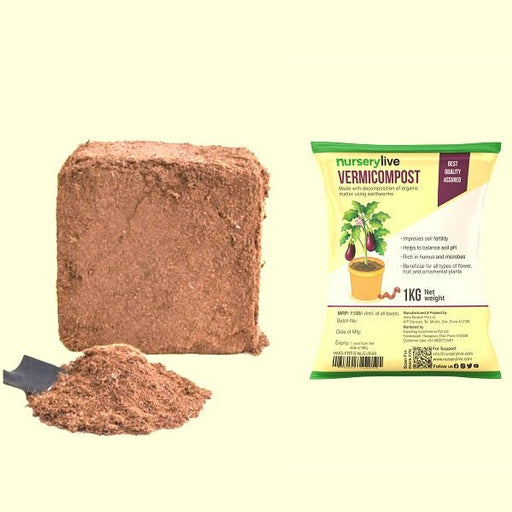 Save 27%
Save 27%
Combo of 2 Vermicompost and Cocopeat - Enrich Your Soil Naturally! Transform your garden into a thriving ecosystem with our Combo of 2 Ver...
View full details
 Save 35%
Save 35%
Best 6 Plants for Perfect Indoor Garden Transform your living space into a lush oasis with our curated collection of the Best 6 Plants for a...
View full details
 Save up to 50%
Save up to 50%
Mini Succulent Garden Pack Transform your space with our Mini Succulent Garden Pack, featuring a delightful collection of 4 any variety beautiful s...
View full details
 Save 30%
Save 30%
5 Best Fragrant Plants Transform your garden or indoor space into a fragrant paradise with our curated selection of the 5 Best Fragrant Plants. Th...
View full details
 Save 24%
Save 24%
Set of 2 Bonsai Looking Grafted Adeniums Transform your indoor or outdoor space with our exquisite Set of 2 Bonsai Looking Grafted Adenium...
View full details Save 45%
Save 45%
Top 4 Die Hard Succulents Pack Transform your indoor or outdoor space with our Top 4 Die Hard Succulents Pack, featuring a curated selecti...
View full details
 Save 30%
Save 30%
5 Best Indoor Plants Pack Transform your living space into a lush oasis with our '5 Best Indoor Plants Pack.' This carefully curated collection fe...
View full details
 Save 25%
Save 25%
Set of 4 Evergreen Air Purifier Plant Pack Transform your indoor space into a lush, green oasis with our Set of 4 Evergreen Air Purifier Pla...
View full details| SrNo | Item Name |
|---|---|
| 1 | Abelmoschus esculentus |
Abelmoschus esculentus, commonly known as okra, is a warm-season vegetable belonging to the Malvaceae family. This green, finger-like pod is not only a culinary delight but also a nutritional powerhouse, rich in vitamins A, C, and K, as well as fiber and antioxidants. Its unique texture and flavor make it a staple in various cuisines, particularly in Southern and African dishes.
What makes okra special is its versatility and health benefits. It is low in calories yet high in essential nutrients, making it an excellent choice for those seeking a healthy diet. Additionally, okra is known for its mucilaginous properties, which can aid digestion and promote gut health.
One of the standout features of Abelmoschus esculentus is its ability to thrive in hot, humid climates, making it an ideal crop for sustainable agriculture. Its deep root system allows it to access water and nutrients efficiently, reducing the need for excessive irrigation.
Abelmoschus esculentus is a drought-resistant crop that can help improve soil health through its deep root system. Its cultivation can contribute to sustainable agricultural practices, reducing the need for chemical fertilizers and pesticides. By promoting biodiversity, okra farming can enhance ecosystem resilience and support local wildlife.
If you think Abelmoschus esculentus, or okra, is just a vegetable, think again! This green marvel is packed with vitamins A, C, and K, making it a nutritional powerhouse. It’s like the superhero of the garden, swooping in to save your health with its fiber-rich goodness. Whether you’re sautéing it, frying it, or tossing it in a gumbo, this veggie is here to boost your immune system and keep your digestive tract happy. Who knew a plant could be so versatile and beneficial?
Ready to channel your inner gardener? Growing Abelmoschus esculentus is easier than pie—well, easier than baking a pie, anyway. This tropical beauty loves warm weather and well-drained soil. Just plant the seeds in a sunny spot, water them like they’re your new best friends, and watch them flourish. In no time, you’ll have a bountiful harvest that’ll make your neighbors green with envy.
Did you know there’s more than one type of Abelmoschus esculentus? That’s right! From the classic green okra to the striking red varieties, these plants come in a rainbow of colors and shapes. Each variety has its own unique flavor profile, so you can mix and match to create a culinary masterpiece. It’s like a vegetable fashion show, and everyone’s invited!
If you think okra is just for gumbo, think again! Abelmoschus esculentus is a culinary chameleon, ready to spice up any dish. From stir-fries to salads, this veggie can do it all. Its unique texture adds a delightful crunch, while its mild flavor complements a variety of spices. So, whether you’re a seasoned chef or a kitchen novice, don’t underestimate the power of okra in your culinary adventures.
Move over, modern medicine! Abelmoschus esculentus has been a staple in traditional medicine for centuries. This plant is believed to have anti-inflammatory and antioxidant properties, making it a go-to remedy for various ailments. From soothing digestive issues to promoting skin health, okra is like that wise old sage in your garden, ready to share its secrets.
Every hero has its villains, and Abelmoschus esculentus is no exception. Pests like aphids and spider mites can wreak havoc on your precious plants. But fear not! With a little vigilance and some organic pest control methods, you can keep these pesky intruders at bay. After all, every garden needs a guardian, and you’re just the hero for the job!
Timing is everything, especially when it comes to harvesting Abelmoschus esculentus. You want to pick those pods when they’re young and tender, usually around 2-4 inches long. Wait too long, and you’ll end up with tough, fibrous okra that’s more suited for a science experiment than a dinner plate. So, grab your basket and channel your inner farmer—your taste buds will thank you!
Let’s talk numbers! Abelmoschus esculentus is low in calories but high in nutrients. With a healthy dose of fiber, vitamins, and minerals, it’s the perfect addition to any diet. Plus, it’s a great source of antioxidants, which means it’s not just good for you; it’s also fighting off those pesky free radicals. Who knew a humble vegetable could pack such a punch?
In the world of sustainable agriculture, Abelmoschus esculentus is a star player. Its ability to thrive in various soil types and climates makes it an excellent choice for eco-friendly farming. Plus, it’s a great companion plant, helping to improve soil health and attract beneficial insects. So, if you’re looking to go green in your gardening efforts, okra is the way to go!
Abelmoschus esculentus isn’t just a vegetable; it’s a cultural icon in many regions. From Southern U.S. cuisine to African and Middle Eastern dishes, okra has woven itself into the fabric of culinary traditions. It’s a symbol of comfort food, family gatherings, and cultural heritage. So, the next time you enjoy a plate of gumbo, remember you’re partaking in a rich tapestry of history and flavor.
Abelmoschus esculentus is like that friend who can adapt to any situation. This plant thrives in warm climates but can also tolerate a range of conditions. Whether you’re in a tropical paradise or a slightly cooler region, okra can find a way to flourish. It’s the ultimate survivor, proving that with a little resilience, you can grow just about anywhere!
Abelmoschus esculentus thrives in warm climates, so think sunny days and well-drained soil. It’s a tropical diva that loves the heat, making it a staple in places like Africa, India, and the Southern U.S. Just remember, it’s not a fan of frost—so keep those chilly nights at bay!
Cooking Abelmoschus esculentus is a culinary adventure! You can fry, steam, or sauté it, but frying is where it shines. Toss it in a pan with some spices, and voilà! You’ve got a dish that’s both delicious and nutritious. Just don’t forget to embrace that delightful sliminess—it’s part of the charm!
Absolutely! Abelmoschus esculentus is a nutritional powerhouse. It’s low in calories but high in fiber, vitamins A and C, and antioxidants. This veggie can help with digestion and may even lower cholesterol. So, if you’re looking for a guilt-free indulgence, okra is your green ticket to health!
Yes, you can! While most people prefer it cooked, Abelmoschus esculentus can be enjoyed raw in salads or as a crunchy snack. Just slice it up and toss it in with your favorite veggies. It’s like the cool kid at the salad bar, adding a unique twist to your greens!
The benefits of Abelmoschus esculentus are as plentiful as its pods! It aids digestion, boosts immunity, and may even help regulate blood sugar levels. Plus, its antioxidants fight off those pesky free radicals. So, eating okra is like giving your body a high-five while keeping it healthy and happy!
To keep your Abelmoschus esculentus fresh, store it in the fridge in a paper bag. This allows it to breathe and prevents moisture buildup, which can lead to slimy situations. Use it within a week for the best flavor. Remember, freshness is key to keeping that okra magic alive!
Yes, indeed! Freezing Abelmoschus esculentus is a great way to preserve its goodness. Blanch it first to lock in flavor and color, then pop it in an airtight container. When you’re ready for a taste of summer in winter, just thaw and cook. It’s like a time capsule of deliciousness!
The culinary possibilities with Abelmoschus esculentus are endless! From gumbo to curries, stir-fries to pickles, this versatile veggie can jazz up any meal. You can even blend it into smoothies for a nutrient boost. Get creative, and let your taste buds explore the world of okra!
Growing Abelmoschus esculentus is a breeze for those with a green thumb! It loves warm weather and can be sown directly into the garden. Just give it plenty of sunlight, water, and a little TLC, and you’ll be rewarded with a bountiful harvest. It’s like gardening with a side of magic!
Abelmoschus esculentus hails from Africa and Asia, where it has been cultivated for centuries. It made its way to the Americas through the slave trade, becoming a beloved staple in Southern cuisine. So, every time you enjoy okra, you’re tasting a piece of history wrapped in a delicious green pod!